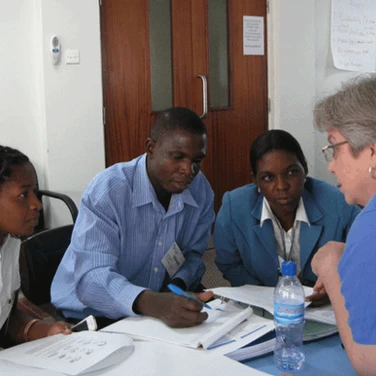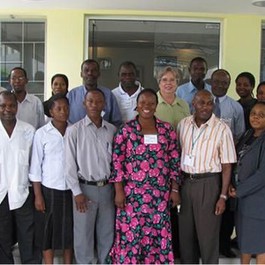Share your experience and help others understand the real-world benefits of following CLSI guidelines. Whether it's improved accuracy, enhanced efficiency, or better compliance, your story can inspire and guide fellow professionals. Submit your experience today and contribute to a global conversation on laboratory excellence!
Accelerating Quality Management in Tanzania
Overview
For over fifteen years, through the United States President’s Emergency Plan for AIDS Relief (PEPFAR) and Global Health Security Agenda (GHSA) programs, CLSI has collaborated with CDC Tanzania, and other partners to support the goals of the Ministry of Health, Community Development, Gender, Elderly, and Children in Tanzania (MOHCDGEC) to ensure sustainable strengthening of the national laboratory system.

Overview
For over fifteen years, through the United States President’s Emergency Plan for AIDS Relief (PEPFAR) and Global Health Security Agenda (GHSA) programs, CLSI has collaborated with CDC Tanzania, and other partners to support the goals of the Ministry of Health, Community Development, Gender, Elderly, and Children in Tanzania (MOHCDGEC) to ensure sustainable strengthening of the national laboratory system.
The Situation
In 2005, Tanzania faced widespread outbreaks of HIV, AIDS, tuberculosis, malaria, and other infectious diseases. To compound the crisis, laboratory testing—used to confirm diagnosis and monitor treatment—was found to be severely inadequate.
Misdiagnoses occur regularly. Clinicians viewed laboratory results as unreliable. And in one study of 4,670 hospital patients treated for malaria, fewer than 50% had their diagnosis confirmed by blood smear.1 The conclusion: inaccurate laboratory tests posed a significant threat to the nation's health.
In a pilot study, the Tanzanian Ministry of Health commissioned CLSI to bring its six largest laboratories to international accreditation standards, upgrading their capabilities and training laboratory personnel in recognized best practices.
The Program
Technical assistance has been delivered in the form of training through centralized and localized workshops, mentorships, and rapid assessments. Over 1,000 laboratory professionals have been trained in Quality Management System (QMS) workshops facilitated by CLSI. Most recently, the workshops have been focused on specific QMS topics such as internal audit, root cause analysis, and corrective action, and quality control and method verification.

Over the past few years, Tanzania’s laboratory strengthening program has been experiencing progressive and exponential growth. With the goal of making the program sustainable, there has been a shift toward building in-country capacity so that there are more local mentors to assist laboratories with QMS implementation. Using a mentor fundamentals course series developed by CLSI, which equips laboratory professionals with mentoring skills, CLSI and partner Management and Development for Health (MDH), have been building a pool of QMS experts that can assist the MOHCDGEC in scaling up laboratory strengthening activities in the country. Today, the Ministry’s Laboratory Services Unit, in partnership with MDH, leads the initiative. CLSI’s Global Training team supports with technical assistance. Currently, there are 40+ local mentors from labs that have been accredited who have been trained through this partnership. Working together, the CLSI mentors and the Tanzanian mentors have been supporting the laboratories that have been implementing SLMTA and those that are preparing for accreditation.
The Results
At the end of the pilot test, all six government laboratories were accredited, a first for any nation in the region. The success of the initial phase led to the program's expansion across the country and the continent.
Before 2014, Tanzania had no accredited labs. In 2014, three achieved accreditation. Over the next four years, CLSI mentored five more labs in their pursuit of accreditation. Tanzania now has over 40 laboratories that have gone through the CLSI mentorship model and achieved international accreditation. More than 25 additional laboratories are implementing QMS with the support of Tanzanian and CLSI mentors in pursuit of accreditation.
With the help and involvement of CLSI, Tanzania is empowering its citizens to achieve a new level of quality health care, promising a better and safer future for all its people.

1 Linda R. Andiric, Charles G. Massambu; Laboratory Quality Improvement in Tanzania, American Journal of Clinical Pathology, Volume 143, Issue 4, 1 April 2015, Pages 566–572, https://doi.org/10.1309/AJCPAB4A6WWPYIEN
Share Your Experience with CLSI Standards in your Laboratory
